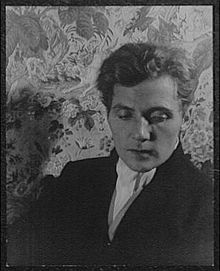Tonio Selwart
Tonio Selwart (born June 9, 1896 in Wartenberg , Bavaria as Anton Theodor Selmair ; † November 2, 2002 in New York , United States ) was a German-Austrian actor who settled in the United States and became a US citizen in 1938.
Live and act
Selmair came from a family that had worked in the medical profession for several generations ; his father Dr. Anton Selmair ran a sanatorium in Munich . After his military service during the First World War, Selmair junior also studied medicine for a few semesters in Vienna and Munich in the Austro-Hungarian army , but finally decided to take up acting. He received classical acting lessons from Gustav Waldau and in Vienna and started his artistic career at the age of 23 after graduating from drama school.
From 1919 he mainly toured (to the Bavarian province, but also to Munich to the Bavarian State Theater in 1929), occasionally Selwart also received permanent engagements (e.g. at the city theater in St. Gallen, Switzerland 1930/31). Among his best-known roles are the Prince of Homburg in the Kleist play of the same name . In 1932 he went on a tour to the USA, where he first attracted attention in October 1932 with his New York appearances in the productions of Liliom and The Lady of the Camellias . He was married to Claire Volkhart , a painter and wax boss, born in Düsseldorf in 1886, who died there in 1935.
When Hitler came to power in Germany in January 1933, Selwart decided to stay in the US and continued his stage career in New York. Until the late 1950s he was seen in such diverse productions as The Pursuit of Happiness , The Laughing Woman , Flight Into China , Russian Bank , Candle in the Wind , Temper the Wind , The Hidden River , Lute Song and And the Wind Blows .
In the middle of World War II, offers from Hollywood were added. Since his debut in 1942 as Prague Gestapo chief Haas in Fritz Lang's resistance drama about the murder of Reinhard Heydrich , Die Henker too , he was entrusted with a number of heavily clichéd roles - mainly Nazis and Wehrmacht uniforms - until shortly before the end of the war. Selwart played Major Brühl in The Cross of Lorraine , was the anti-Semitic Nazi chief ideologist Alfred Rosenberg (whom Selwart had met personally in the 1920s) in The Hitler Gang , but also gave an imaginary UN President in Peter Ustinov's East-West Satire Romanoff and Julia , headed Aranda as council president in Die nackte Maja Kastilien and tried in the politician biography Wilson as Kaiser Wilhelm's ambassador in Washington 1917 to prevent the USA from entering the war against Germany. With the part of the aged General von Mackensen in the Italian war film Battle for Anzio , his last completed film work , Tonio Selwart achieved his highest military rank in the cinema.
After the Second World War, Tonio Selwart, who was well known to Thomas Mann's family , also took part in television productions (series Zorro and some guest appearances). Selwart died of pneumonia at the age of 106 in Manhattan, his adopted home for seven decades. He was buried in the family grave in Wartenberg.
Filmography
- 1942: Executioners die too (Hangmen Also Die!)
- 1942: Rising in Trollness (Edge of Darkness)
- 1943: The Cross of Lorraine
- 1943: The North Star
- 1943: Tampico
- 1944: The Hitler Gang
- 1944: Wilson
- 1944: Strange Affair
- 1951: Spies, Love and the Fire Brigade ( My Favorite Spy )
- 1951: Il lupo della frontiera
- 1954: Longing ( Senso )
- 1954: The Barefoot Countess (The Barefoot Contessa)
- 1954: Treason ( Traidita )
- 1954: The beautiful Helena (Helen of Troy)
- 1956: Blood Red Congo ( Congo Crossing )
- 1958: Storm in the East ( La tempesta )
- 1958: The naked Maja ( La Maja desnuda )
- 1959: Jovanka and the others ( Jovanka e le altre )
- 1960: Romanoff and Julia ( Romanoff and Juliet )
- 1962: An odd saint ( The Reluctant Saint )
- 1967: Battle of Anzio (Lo sbarco di Anzio)
- 2018: The Other Side of the Wind (shot in the early 1970s)
literature
- Brigitte Bruns: Selwart, Tonio. In: New German Biography (NDB). Volume 24, Duncker & Humblot, Berlin 2010, ISBN 978-3-428-11205-0 , pp. 232-234 ( digitized version ).
Web links
- Timo Fehrensen: Tonio Selwart, Nazi on duty, Welt Online
- NY infected by the "Tonio Selwart fever, Merkur-online.de
- Tonio Selwart in the Internet Movie Database (English)
Individual evidence
- ^ GND: Claire Selmair; Claire Volkhart (maiden name)
- ^ Wiener Zeitung Online: A New Yorker by choice - Tonio Selwart died at the age of 106. In: wienerzeitung.at. November 5, 2002, accessed March 14, 2018 .
| personal data | |
|---|---|
| SURNAME | Selwart, Tonio |
| ALTERNATIVE NAMES | Anton Theodor Selmair |
| BRIEF DESCRIPTION | German-American actor |
| DATE OF BIRTH | June 9, 1896 |
| PLACE OF BIRTH | Wartenberg (Upper Bavaria) |
| DATE OF DEATH | November 2, 2002 |
| Place of death | New York City |
